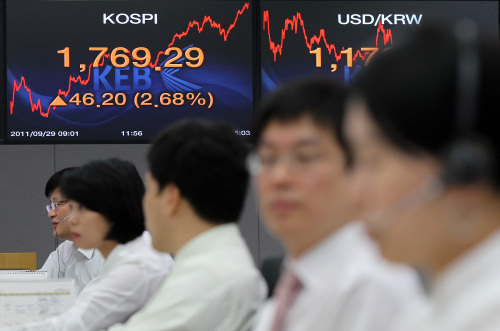
Contingency plan activated; top financial regulator sees extended turmoil in market
The alert level for Korea’s financial market has been raised to the second highest in the five-tier scale, reflecting the growing concerns about the possibility of the global recession as well as the embattled eurozone struggling with the fiscal debt woes.
Korean authorities have drawn up a contingency plan in accordance with the danger level to deal with the global economic turmoil, and the latest assessment signals that risks are mounting for the Asia’s fourth-largest economy.
The KOSPI stock market ended up 46.20 points to 1,769.29, and the junior bourse KOSDAQ closed up 9.06 points to 443.26 on Thursday. The local currency was 1,173.5 won against the U.S. dollar at its 3:00 p.m. close, compared with 1,171.2 won the previous session.
The five-tier danger scale, designed to measure the country’s financial markets, is “normal,” “attention,” “caution,” “alert” and “serious” in the ascending order of seriousness, and the current level is only one notch lower than the highest, said officials from the Financial Services Commission and its executive body, the Financial Supervisory Service.
Each level is measured on risks linked to global credit, the nation’s sovereign credit, stock and currency market situations and capital market flows.
Korea’s top financial regulator also said Thursday the country should brace for an extended period of instability stemming from external factors.
“From the first half of this year, the possibility of crisis from Greece was widely circulated, but the problem now is that more substantial and serious impact might be materialized,” FSS Chairman Kim Seok-dong told reporters after meeting with local bank chiefs.
“But I’m relieved to confirm that Korean banks have made great efforts to increase their foreign currency holdings and diversify their foreign borrowings,” Kim said.
Kim’s comment came as Korean lenders’ vulnerability to the current eurozone crisis was pointed out due to their exposure to European banks, which might withdraw their loans en masse if the deepening sovereign debt crisis leads to the default of Greece and other major European economies.
Korea’s stock market recently suffered a steep loss amid growing worries over the eurozone problem and the recession risks facing the U.S. economy. The Korean won was also under strong downward pressure as foreign investors reduced their holdings in emerging market currencies to channel their funds to the U.S. dollar.
Korean authorities are trying to stabilize the market by taking measures including verbal intervention in the currency market and introducing new policies aimed at monitoring the financial markets and detecting potential risk factors.
The government earlier mapped out a contingency plan against risky situations, and due to the newly raised danger level, the contingency plan has been activated but FSC officials declined to reveal the plan’s details.
By Yang Sung-jin (insight@heraldcorp.com)
The alert level for Korea’s financial market has been raised to the second highest in the five-tier scale, reflecting the growing concerns about the possibility of the global recession as well as the embattled eurozone struggling with the fiscal debt woes.
Korean authorities have drawn up a contingency plan in accordance with the danger level to deal with the global economic turmoil, and the latest assessment signals that risks are mounting for the Asia’s fourth-largest economy.
The KOSPI stock market ended up 46.20 points to 1,769.29, and the junior bourse KOSDAQ closed up 9.06 points to 443.26 on Thursday. The local currency was 1,173.5 won against the U.S. dollar at its 3:00 p.m. close, compared with 1,171.2 won the previous session.
The five-tier danger scale, designed to measure the country’s financial markets, is “normal,” “attention,” “caution,” “alert” and “serious” in the ascending order of seriousness, and the current level is only one notch lower than the highest, said officials from the Financial Services Commission and its executive body, the Financial Supervisory Service.
Each level is measured on risks linked to global credit, the nation’s sovereign credit, stock and currency market situations and capital market flows.
Korea’s top financial regulator also said Thursday the country should brace for an extended period of instability stemming from external factors.
“From the first half of this year, the possibility of crisis from Greece was widely circulated, but the problem now is that more substantial and serious impact might be materialized,” FSS Chairman Kim Seok-dong told reporters after meeting with local bank chiefs.
“But I’m relieved to confirm that Korean banks have made great efforts to increase their foreign currency holdings and diversify their foreign borrowings,” Kim said.
Kim’s comment came as Korean lenders’ vulnerability to the current eurozone crisis was pointed out due to their exposure to European banks, which might withdraw their loans en masse if the deepening sovereign debt crisis leads to the default of Greece and other major European economies.
Korea’s stock market recently suffered a steep loss amid growing worries over the eurozone problem and the recession risks facing the U.S. economy. The Korean won was also under strong downward pressure as foreign investors reduced their holdings in emerging market currencies to channel their funds to the U.S. dollar.
Korean authorities are trying to stabilize the market by taking measures including verbal intervention in the currency market and introducing new policies aimed at monitoring the financial markets and detecting potential risk factors.
The government earlier mapped out a contingency plan against risky situations, and due to the newly raised danger level, the contingency plan has been activated but FSC officials declined to reveal the plan’s details.
By Yang Sung-jin (insight@heraldcorp.com)


















